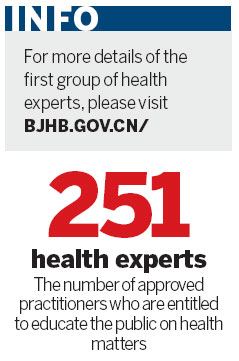
BEIJING - The Beijing Health Bureau released the names of its first selected group of 251 health experts on Monday. The experts will be legally entitled to educate the public on health matters.
The bureau recommended local media in the capital, including Beijing Television Station and Beijing Evening News, to use experts on the list for future reports or programs about health issues.
"As people's health awareness has grown in recent years, some self-proclaimed experts, like Zhang Wuben, appear in the media to make money, but their advice misleads people," said Xie Hui, director of the disease control department of the Beijing Health Bureau. "So we are aiming to create a standardized team of health experts."
|
 |
In a notable hoax last year, the self-proclaimed food expert, Zhang Wuben, published a popular healthcare book claiming mung beans can cure all chronic diseases. Some people followed Zhang's advice and stopped taking medication and took up eating mung beans instead in the hope of regaining their health. Zhang was later proved to be a fraud.
Fake experts were also found to have prescribed such things as eating loaches and injecting Chinese angelica extract. In the latest case, a doctor tried to convince people through the Internet that he could cure chronic disease by drawing 850 milliliters of blood from people.
Shen Yin, 60, a Beijing citizen, said it was hard for ordinary people to tell whether what a TV expert said was true or false.
"Some theories sound too ridiculous, say, eating loaches, which I would find unacceptable," Shen said. "But I would believe eating mung beans is good for health, because I thought they contained good stuff."Xie Hui, from the health bureau, said: "People can neither develop health awareness nor adopt a healthy lifestyle by listening to these people. We need some real experts."
The health bureau invited doctors in Beijing's 141 hospitals to apply to be volunteers in March. Once selected, the experts would be granted the title of "recommended health expert" for two years.
The experts are allowed to take part in any popular science activities, such as talking on TV shows or giving lectures. But they would lose the title if they used it to make money.
"We did not set a high threshold for the doctors, only that they had experience in spreading health knowledge," Xie said.
Lin Hua, deputy director of the obstetrics and gynecology department of the China-Japan Friendship Hospital, is on the expert list.
"I would like to inform people about the health risks of abortions and healthcare for menopausal women," said Lin, who already gives free lectures to women to pass on scientific knowledge.
"I had seen TV shows talking too much about scraping and acupuncture. To make it balanced, the producers should include more items on maintaining health.
"We can improve people's medical awareness bit by bit, until they can separate the true from the false by themselves."
The selected health experts cover 18 medical specialties.
Traditional Chinese Medicine doctors and physicians make up 35 percent of the list.